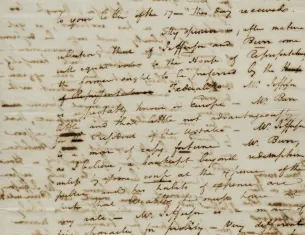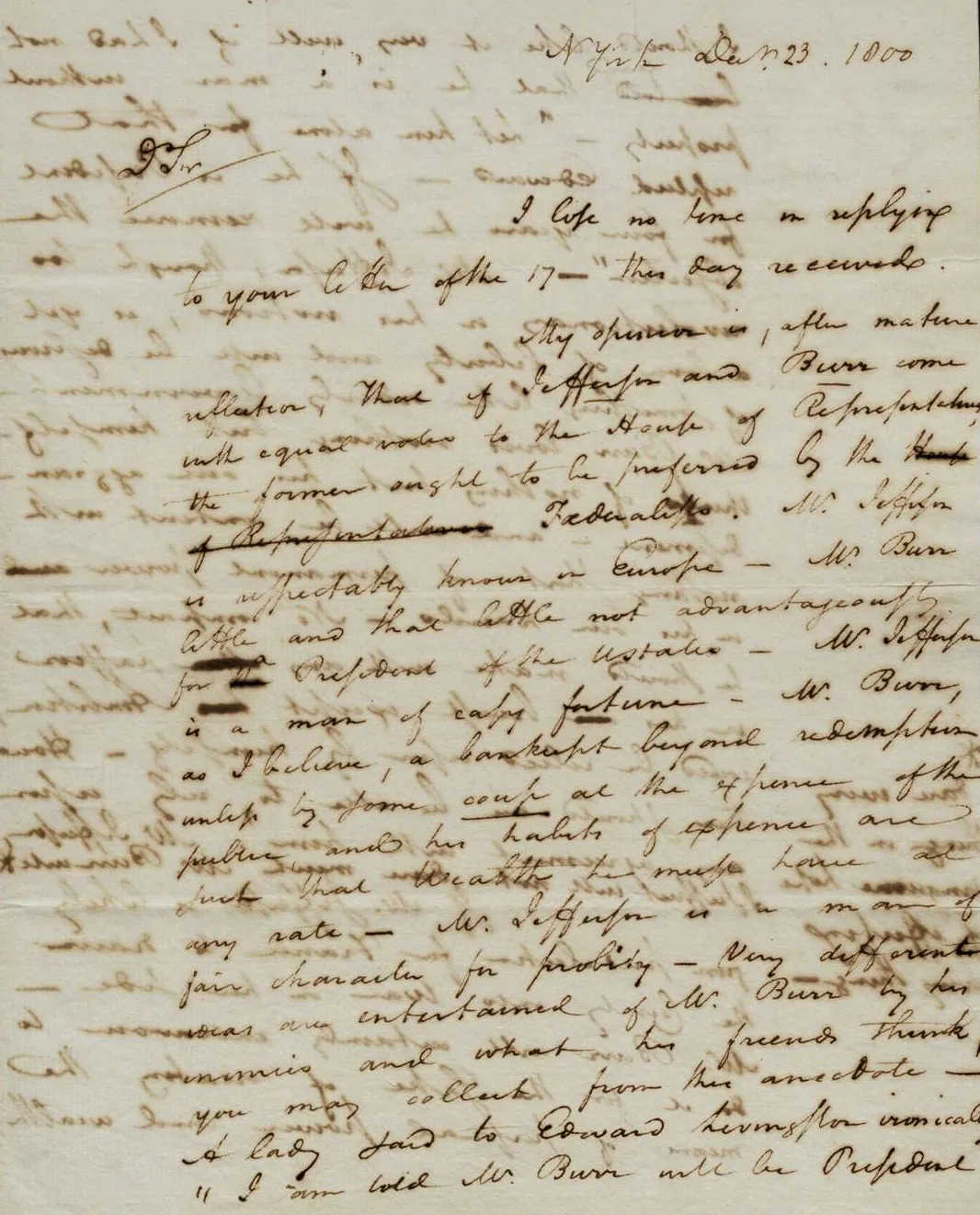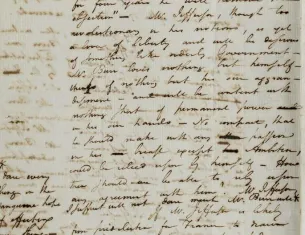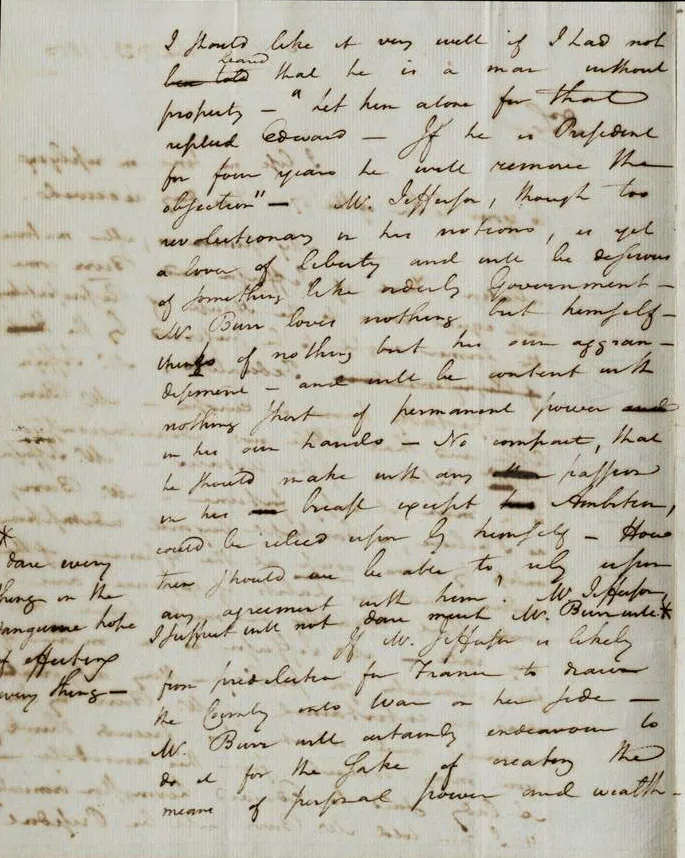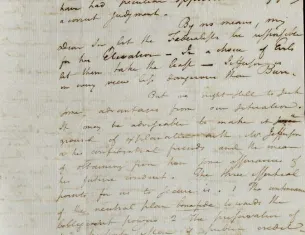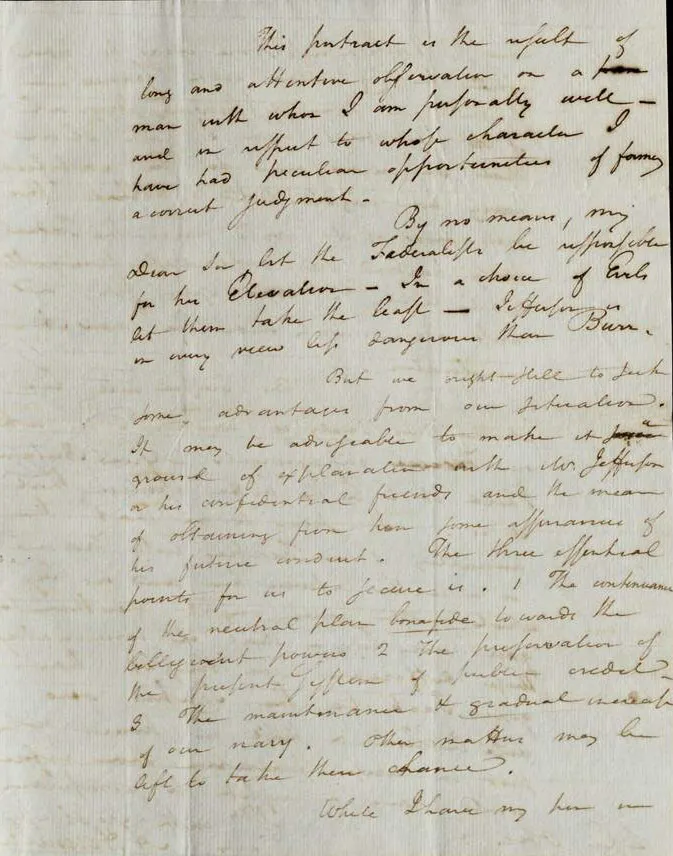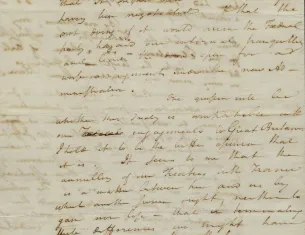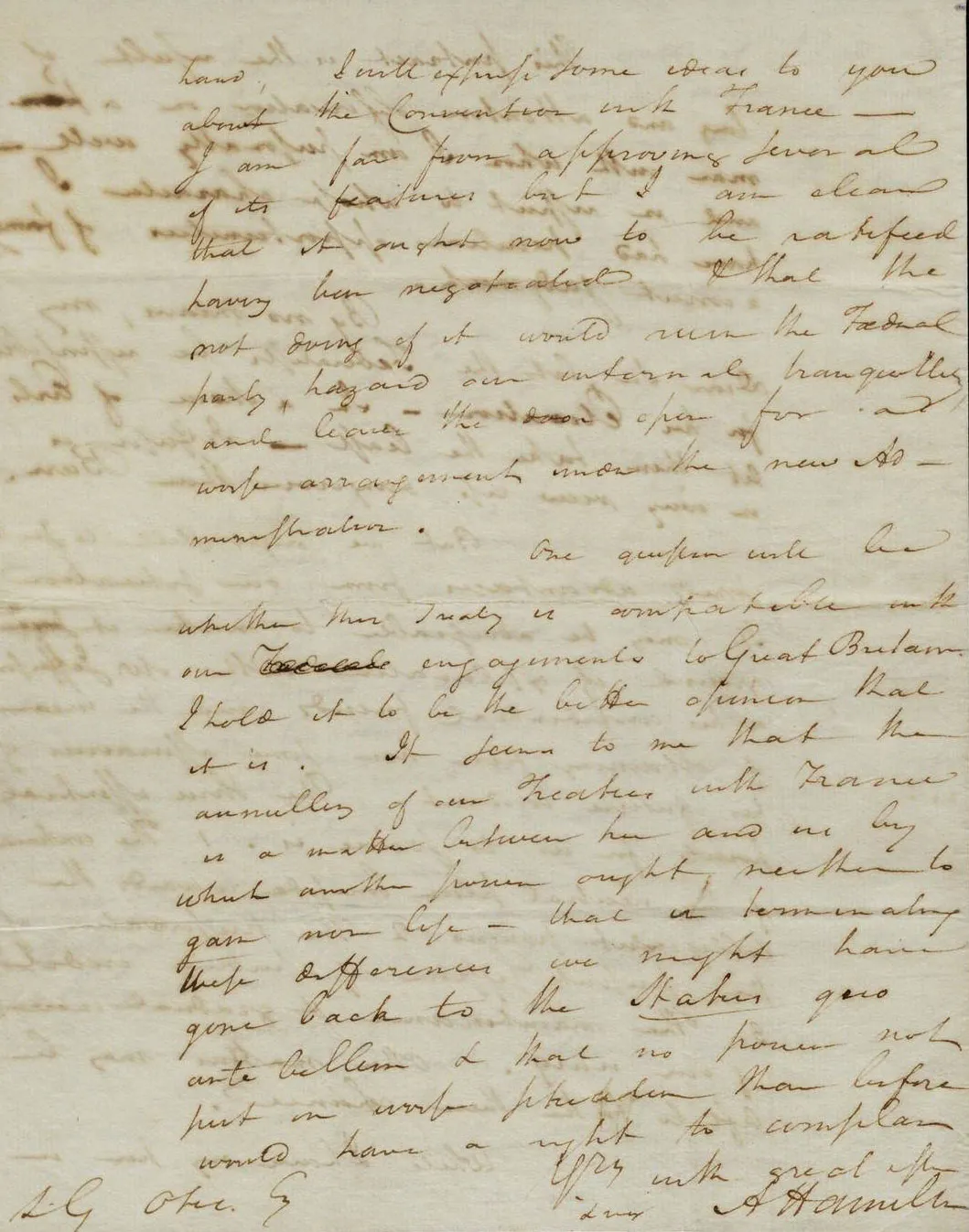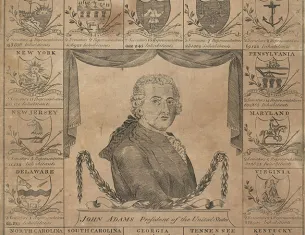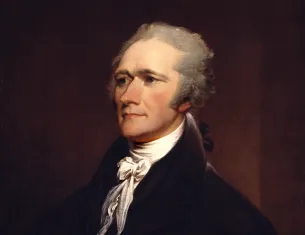“Jefferson is in every view less dangerous than Burr,” 1800
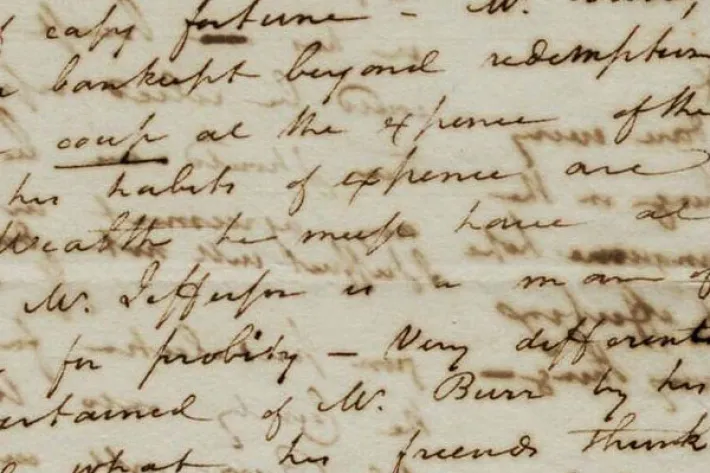
Alexander Hamilton to Harrison Gray Otis, December 23, 1800 (The Gilder Lehrman Institute of American History)
The presidential election of 1800 provided Alexander Hamilton, former secretary of the treasury, with a dilemma: a tie between Thomas Jefferson, a man whose principles were in direct opposition to Hamilton’s own, and Aaron Burr, a man Hamilton believed to have no principles at all. As the House of Representatives prepared to vote to break the deadlock, Hamilton conducted a furious letter-writing campaign to urge fellow Federalists to vote for Jefferson. In this letter written on December 23, 1800, to Harrison Gray Otis, a Massachusetts congressman, Hamilton questions Burr’s character and overriding ambition.
In the musical, Hamilton declares his sentiments in “The Election of 1800”:
The people are asking to hear my voice
For the country is facing a difficult choice
And if you were to ask me who I’d promote—
—Jefferson has my vote
I have never agreed with Jefferson once
We have fought on like seventy-five diff’rent fronts
But when all is said and all is done
Jefferson has beliefs. Burr has none
A Letter from Alexander Hamilton to Harrison Otis, December 23, 1800
N York Decr. 23. 1800
Dr Sir,
I lose no time in replying to your letter of the 17– this day received.
My opinion is, after mature reflection, that if Jefferson and Burr come with equal votes to the House of Representatives, the former ought to be preferred by the Federalists. Mr. Jefferson is respectably known in Europe – Mr. Burr little and that little not advantageously for a President of the U States – Mr. Jefferson is a man of easy fortune – Mr. Burr, as I believe, a bankrupt beyond redemption, unless by some coup at the expence of the public, and his habits of expence are such that Wealth he must have at any rate – Mr. Jefferson is a man of fair character for probity – Very different ideas are entertained of Mr. Burr by his enemies and what his friends think, you may collect from this anecdote – A lady said to Edward Livingston ironically “I am told Mr. Burr will be President I should like it very well if I had not heard that he is a man without property –“Let him alone for that replied Edward – If he is President for four years he will remove the objection” – Mr. Jefferson, though too revolutionary in his notions, is yet a lover of liberty and will be desirous of something like orderly Government – Mr. Burr loves nothing but himself – thinks of nothing but his own aggrandizement – and will be content with nothing short of permanent power in his own hands – No compact, that he should make with any passion in his breast except Ambition, could be relied upon by himself – How then should we be able to rely upon any agreement with him? Mr. Jefferson, I suspect will not dare much Mr. Burr will dare every thing in the sanguine hope of effecting every thing –
If Mr. Jefferson is likely from predilection for France to draw the Country into War on her side – Mr. Burr will certainly endeavour to do it for the Sake of creating the means of personal power and wealth.
This portrait is the result of long and attentive observation on a man with whom I am personally well – and in respect to whose character I have had peculiar opportunities of forming a correct judgment.
By no means, my Dear Sir, let the Federalists be responsible for his Elevation – In a choice of Evils let them take the least – Jefferson is in every view less dangerous than Burr.
But we ought – still to seek some advantages from our situation. It may be adviseable to make it a ground of exploration with Mr. Jefferson or his confidential friends and the means of obtaining from him some assurances of his future conduct. The three essential points for us to secure is. 1 The continuance of the neutral plan bonafide towards the belligerent powers 2 The preservation of the present System of public credit – 3 The maintenance & gradual increase of our navy. Other matters may be left to take their chance.
While I have my pen in hand, I will express some ideas to you about the Convention with France – I am far from approving several of its features but I am clear that it ought now to be ratified having been negotiated & that the not doing of it would ruin the Federal party, hazard our internal tranquillity, and leave the door open for a worse arrangement under the new Administration.
One question will be whether this Treaty is compatible with our engagements to Great Britain. I hold it to be the better opinion that it is. It seems to me that the annulling of our Treaties with France is a matter between her and us by which another power ought neither to gain nor lose – that in terminating these differences we might have gone back to the Status quo ante bellum & that no power not put in worse situation than before would have a right to complain.
Yrs. with great aft & resp
A Hamilton
H.G Otis. Esq
Source: Alexander Hamilton to Harrison Gray Otis, December 23, 1800, The Gilder Lehrman Institute of American History, GLC00496.
A Letter from Alexander Hamilton to Harrison Otis, December 23, 1800
N York Decr. 23. 1800
Dr Sir,
I lose no time in replying to your letter of the 17– this day received.
My opinion is, after mature reflection, that if Jefferson and Burr come with equal votes to the House of Representatives, the former ought to be preferred by the Federalists. Mr. Jefferson is respectably known in Europe – Mr. Burr little and that little not advantageously for a President of the U States – Mr. Jefferson is a man of easy fortune – Mr. Burr, as I believe, a bankrupt beyond redemption, . . . – Mr. Jefferson is a man of fair character for probity – Very different ideas are entertained of Mr. Burr by his enemies and what his friends think, . . . Mr. Jefferson, though too revolutionary in his notions, is yet a lover of liberty and will be desirous of something like orderly Government – Mr. Burr loves nothing but himself – thinks of nothing but his own aggrandizement – and will be content with nothing short of permanent power in his own hands – No compact, that he should make with any passion in his breast except Ambition, could be relied upon by himself – How then should we be able to rely upon any agreement with him? Mr. Jefferson, I suspect will not dare much Mr. Burr will dare every thing in the sanguine hope of effecting every thing –
If Mr. Jefferson is likely from predilection for France to draw the Country into War on her side – Mr. Burr will certainly endeavour to do it for the Sake of creating the means of personal power and wealth . . . By no means, my Dear Sir, let the Federalists be responsible for his Elevation – In a choice of Evils let them take the least – Jefferson is in every view less dangerous than Burr.
. . . It may be adviseable to make it a ground of exploration with Mr. Jefferson or his confidential friends and the means of obtaining from him some assurances of his future conduct. The three essential points for us to secure is. 1 The continuance of the neutral plan bonafide towards the belligerent powers 2 The preservation of the present System of public credit – 3 The maintenance & gradual increase of our navy . . .
Yrs. with great aft & resp
A Hamilton
H.G Otis. Esq
Source: Alexander Hamilton to Harrison Gray Otis, December 23, 1800, The Gilder Lehrman Institute of American History, GLC00496.
former - the first of two
redemption - deliverance from sin
probity - honest
aggrandizement - expansion of power and wealth
sanguine - confident
predilection - preference
endeavor - strive, attempt, try
bonafide - in good faith
Background
The presidential election of 1800 provided Alexander Hamilton, former secretary of the treasury, with a dilemma: a tie between Thomas Jefferson, a man whose principles were in direct opposition to Hamilton’s own, and Aaron Burr, a man Hamilton believed to have no principles at all. As the House of Representatives prepared to vote to break the deadlock, Hamilton conducted a furious letter-writing campaign to urge fellow Federalists to vote for Jefferson. In this letter written on December 23, 1800, to Harrison Gray Otis, a Massachusetts congressman, Hamilton questions Burr’s character and overriding ambition.
In the musical, Hamilton declares his sentiments in “The Election of 1800”:
The people are asking to hear my voice
For the country is facing a difficult choice
And if you were to ask me who I’d promote—
—Jefferson has my vote
I have never agreed with Jefferson once
We have fought on like seventy-five diff’rent fronts
But when all is said and all is done
Jefferson has beliefs. Burr has none
Transcript
A Letter from Alexander Hamilton to Harrison Otis, December 23, 1800
N York Decr. 23. 1800
Dr Sir,
I lose no time in replying to your letter of the 17– this day received.
My opinion is, after mature reflection, that if Jefferson and Burr come with equal votes to the House of Representatives, the former ought to be preferred by the Federalists. Mr. Jefferson is respectably known in Europe – Mr. Burr little and that little not advantageously for a President of the U States – Mr. Jefferson is a man of easy fortune – Mr. Burr, as I believe, a bankrupt beyond redemption, unless by some coup at the expence of the public, and his habits of expence are such that Wealth he must have at any rate – Mr. Jefferson is a man of fair character for probity – Very different ideas are entertained of Mr. Burr by his enemies and what his friends think, you may collect from this anecdote – A lady said to Edward Livingston ironically “I am told Mr. Burr will be President I should like it very well if I had not heard that he is a man without property –“Let him alone for that replied Edward – If he is President for four years he will remove the objection” – Mr. Jefferson, though too revolutionary in his notions, is yet a lover of liberty and will be desirous of something like orderly Government – Mr. Burr loves nothing but himself – thinks of nothing but his own aggrandizement – and will be content with nothing short of permanent power in his own hands – No compact, that he should make with any passion in his breast except Ambition, could be relied upon by himself – How then should we be able to rely upon any agreement with him? Mr. Jefferson, I suspect will not dare much Mr. Burr will dare every thing in the sanguine hope of effecting every thing –
If Mr. Jefferson is likely from predilection for France to draw the Country into War on her side – Mr. Burr will certainly endeavour to do it for the Sake of creating the means of personal power and wealth.
This portrait is the result of long and attentive observation on a man with whom I am personally well – and in respect to whose character I have had peculiar opportunities of forming a correct judgment.
By no means, my Dear Sir, let the Federalists be responsible for his Elevation – In a choice of Evils let them take the least – Jefferson is in every view less dangerous than Burr.
But we ought – still to seek some advantages from our situation. It may be adviseable to make it a ground of exploration with Mr. Jefferson or his confidential friends and the means of obtaining from him some assurances of his future conduct. The three essential points for us to secure is. 1 The continuance of the neutral plan bonafide towards the belligerent powers 2 The preservation of the present System of public credit – 3 The maintenance & gradual increase of our navy. Other matters may be left to take their chance.
While I have my pen in hand, I will express some ideas to you about the Convention with France – I am far from approving several of its features but I am clear that it ought now to be ratified having been negotiated & that the not doing of it would ruin the Federal party, hazard our internal tranquillity, and leave the door open for a worse arrangement under the new Administration.
One question will be whether this Treaty is compatible with our engagements to Great Britain. I hold it to be the better opinion that it is. It seems to me that the annulling of our Treaties with France is a matter between her and us by which another power ought neither to gain nor lose – that in terminating these differences we might have gone back to the Status quo ante bellum & that no power not put in worse situation than before would have a right to complain.
Yrs. with great aft & resp
A Hamilton
H.G Otis. Esq
Source: Alexander Hamilton to Harrison Gray Otis, December 23, 1800, The Gilder Lehrman Institute of American History, GLC00496.
Excerpt
A Letter from Alexander Hamilton to Harrison Otis, December 23, 1800
N York Decr. 23. 1800
Dr Sir,
I lose no time in replying to your letter of the 17– this day received.
My opinion is, after mature reflection, that if Jefferson and Burr come with equal votes to the House of Representatives, the former ought to be preferred by the Federalists. Mr. Jefferson is respectably known in Europe – Mr. Burr little and that little not advantageously for a President of the U States – Mr. Jefferson is a man of easy fortune – Mr. Burr, as I believe, a bankrupt beyond redemption, . . . – Mr. Jefferson is a man of fair character for probity – Very different ideas are entertained of Mr. Burr by his enemies and what his friends think, . . . Mr. Jefferson, though too revolutionary in his notions, is yet a lover of liberty and will be desirous of something like orderly Government – Mr. Burr loves nothing but himself – thinks of nothing but his own aggrandizement – and will be content with nothing short of permanent power in his own hands – No compact, that he should make with any passion in his breast except Ambition, could be relied upon by himself – How then should we be able to rely upon any agreement with him? Mr. Jefferson, I suspect will not dare much Mr. Burr will dare every thing in the sanguine hope of effecting every thing –
If Mr. Jefferson is likely from predilection for France to draw the Country into War on her side – Mr. Burr will certainly endeavour to do it for the Sake of creating the means of personal power and wealth . . . By no means, my Dear Sir, let the Federalists be responsible for his Elevation – In a choice of Evils let them take the least – Jefferson is in every view less dangerous than Burr.
. . . It may be adviseable to make it a ground of exploration with Mr. Jefferson or his confidential friends and the means of obtaining from him some assurances of his future conduct. The three essential points for us to secure is. 1 The continuance of the neutral plan bonafide towards the belligerent powers 2 The preservation of the present System of public credit – 3 The maintenance & gradual increase of our navy . . .
Yrs. with great aft & resp
A Hamilton
H.G Otis. Esq
Source: Alexander Hamilton to Harrison Gray Otis, December 23, 1800, The Gilder Lehrman Institute of American History, GLC00496.
former - the first of two
redemption - deliverance from sin
probity - honest
aggrandizement - expansion of power and wealth
sanguine - confident
predilection - preference
endeavor - strive, attempt, try
bonafide - in good faith
